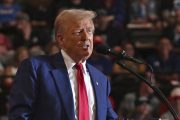
Despite the dark warnings that the tariff policies of President Donald Trump are going to lead to a “trade war,” and subsequent damage to the U.S. economy, many economists are modifying their economic forecasts — from a three-percent increase in the Gross Domestic Product (GDP) to an astounding four-percent increase.
When Trump was running for president, and early in his administration, he often cited the tariffs that President Ronald Reagan slapped on foreign motorcycles — intended to stave off bankruptcy for the iconic Harley-Davidson company. Harley-Davidson did survive, but now Trump and Harley-Davidson’s relationship has entered a new contentious phase.
On Monday, Harley-Davidson announced it was moving some of its production out of the country, blaming tariffs from the European Union (EU). The EU announced its higher tariffs as retaliation for the Trump administration’s import taxes on steel and aluminum. But none of the motorcycle production of the company is moving to Europe, but rather to plants in Brazil, India, Australia, and Thailand.
In fact, the local union in Kansas City claims that some the work from the Harley factory shutting down there is being moving to Thailand. The company, on the other hand, says that all of its Kansas City production is going to a plant in York, Pennsylvania.
Harley defends its move to Thailand on the grounds that it can avoid that country’s 60-percent tariffs on imported motorcycles. Matt Levatich, CEO of Harley-Davidson, told Bloomberg News in April that he faulted Trump’s move to withdraw from the Trans-Pacific Partnership, a “free trade” agreement among 11 nations, mostly in Asia. The TPP also enables them to take advantage of some tax breaks when they then export to other nations near Thailand.
Trump was not happy, especially considering the praise he had given Harley-Davidson previously. He tweeted his feelings Tuesday. “A Harley-Davidson should never be built in another country — never! Their employees and customers are already very angry at them. If they move, watch, it will be the beginning of the end — they surrendered, they quit! The Aura will be gone and they will be taxed like never before!”
He soon followed those remarks up with another tweet. “Early this year Harley-Davidson said they would move much of their plant operations in Kansas City to Thailand. That was long before Tariffs were announced. Hence, they were just using Tariffs/Trade War as an excuse. Shows how unbalanced & unfair trade is, but we will fix it.”
Writing for CNBC, Evelyn Cheng said, “Trade tensions between the U.S. and the rest of the world have increased in the last several months. Harley’s announcement made the company one of the first to disclose a negative impact from tit-for-tat tariffs.”
But what is the actual economic impact for the average American? Suzanne O’Halloron, the managing editor for Fox Business.com, had a different view. “Despite President Trump’s tit-for-tat trade barbs, America’s CEOs are not wasting any time in taking advantage of his tax reform plan. Over $300 billion was repatriated to the U.S. in the first quarter, according to the Bureau of Economic Analysis.”
That was the most ever recorded.
Kevin Hassett, who chairs the president’s Council of Economic Advisers, told Fox Business’ Varney & Company recently, “U.S. firms that used to build their factories overseas in order to avoid U.S. taxes, they stopped in their tracks because of the tax bill, they are bringing all the money home.”
What is causing this surge in repatriation? The tax rate on foreign earnings was drastically reduced for companies when they return the funds to the United States. In comparison to this quarter’s $300 billion, last year’s first quarter repatriations was only about $38 billion.
The positive economic consequences of the tax bill signed by President Trump in December of last year are becoming increasingly obvious.
Despite the obvious boon to the economy, Mark Zandi, the chief economist at Moody’s Analytics, told Fox Business that the benefit to the economy would probably be minimal. “The repatriated cash will go to more stock repurchases, dividend increases, and paying for mergers and acquisitions. All of this has no significant impact on the economy,” Zandi argued.
But Zandi’s analysis might be tinged with partisanship. In contrast to his pessimistic forecast of the Trump Economy, Zandi’s enthusiasm for the proposed Obama economic stimulus package was cited by Christina Romer and Jared Bernstein when they were advocating for Congress to enact President Barack Obama’s American Recovery and Reinvestment Plan back in 2009. He has also opposed the privatization of Fannie Mae and Freddie Mac.
House Ways and Means Chairman Kevin Brady, on the other hand, argues that Trump’s tax plan is working so well that he is for making the tax cuts permanent, and even wants deeper tax benefits, especially to bring back even more company earnings in overseas accounts. The United States Public Interest Research Group has noted that prior to the Republican tax reform enacted in December 2017 — which was done with Trump’s strong backing — $2.6 trillion was in these overseas accounts.
Part of the motivation for Trump’s tariff actions is not to start a “trade war,” but rather to push other countries to lower their own tariffs on the importation of American-made goods. Combined with actions such as the 2017 tax bill, Trump’s refusal to simply accept unfair trade practices by other nations is a strong component of the remarkable growth in the U.S. economy in the months since he took office.
Photo: Clipart.com



